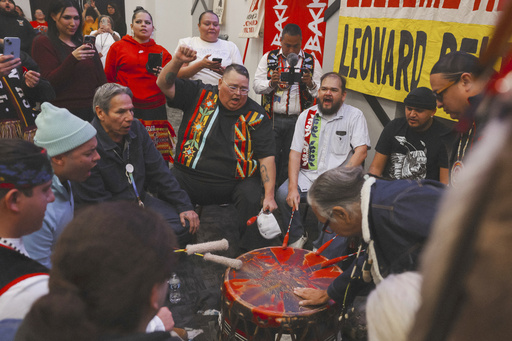BELCOURT, N.D. — On Wednesday, Native American activist Leonard Peltier returned home to North Dakota to a warm welcome from his supporters, just one day after being released from a Florida prison where he had been serving a life sentence for the 1975 murders of two FBI agents. Peltier, who is now 80 years old, expressed gratitude and pride while speaking to approximately 500 people at a festive gathering that included food, a drum circle, and traditional dancers at a center in Belcourt, situated near the Canadian border on the Turtle Mountain Band of Chippewa Indians’ reservation.
“I’m truly grateful for the support you have all shown me,” Peltier remarked, visibly emotional. “I struggle to hold back tears. A strong warrior shouldn’t be seen crying in front of his people.” His release was made possible when President Joe Biden commuted his life sentence to home confinement, allowing him to leave the Coleman penitentiary on Tuesday. In 1975, Peltier was convicted on two counts of first-degree murder, resulting from a violent encounter at the Pine Ridge Indian Reservation in South Dakota, where FBI agents Jack Coler and Ronald Williams lost their lives.
Although Peltier admitted to firing shots during the incident, he maintains that he is not the individual who killed the agents. Many within Native American communities regard him as a political prisoner who was unjustly convicted for advocating Indigenous rights through his involvement with the American Indian Movement. However, this perspective has faced resistance over the years from law enforcement officials who have opposed his release. Current and former FBI agents have contested his claims of innocence, and as Biden deliberated his options towards the end of his term, former FBI Director Christopher Wray cautioned that Peltier was “a remorseless killer” who should remain incarcerated.
In remarks about the commutation, Biden noted that a wide array of organizations and individuals supported Peltier’s release, citing factors such as his lengthy imprisonment, advanced age, and his significant role among Native Americans. Throughout his decades behind bars, Peltier has consistently maintained his innocence regarding the charges against him. During the celebration, he affirmed, “I spent 49 years in prison for a crime I did not commit.” Reflecting on his lengthy incarceration, he recognized how he entered prison as a young man and has now emerged at the age of 80. He emphasized his efforts to advocate for Native American issues throughout his confinement and expressed appreciation for the tribal communities that stood by him over the years.
Peltier stated, “From the very first hour I was arrested, Indigenous people were there to support me from across the nation.” During the welcome event, tribal leaders presented him with an eagle feather staff, which had been carried by his supporters during their campaign for his release, along with a traditional star quilt that he draped over his shoulder with pride.
Nick Tilsen, founder of the Indigenous advocacy group NDN Collective, honored Peltier and his contemporaries from the American Indian Movement for their courage in challenging “the most powerful government in the world.” He added that Peltier’s legacy would endure, recognized globally as a resilient warrior who persevered against immense odds.
The turnout at the event spoke volumes about Peltier’s significance to the Turtle Mountain Band of Chippewa Indians and the broader Native American community. Tribal Chair Jamie Azure remarked, “The overwhelming support you can observe here today signifies the deep meaning of this homecoming for many people across various levels.” Denise Lajimodiere, a fellow tribal member, summarized the occasion by saying, “It’s a momentous day — a day of celebration.”




